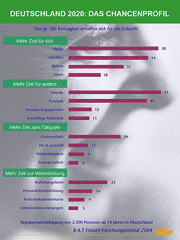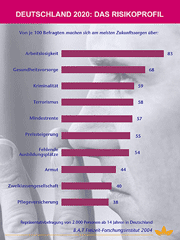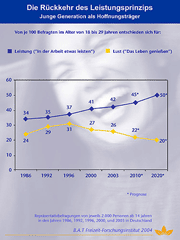Germany 2020
What to do, Germany?
Putting our future viability to the test
Germany's future has two faces: on the one hand, there is no quick end in sight to the ongoing structural crisis, which is having a noticeable impact on social security systems in particular. When thinking about the future of the next ten to twenty years, Germans are most concerned about unemployment (83%), healthcare (68%), crime (59%), terrorism (58%), minimum pensions (57%) and price increases (55%). On the other hand, there is a growing willingness among German citizens to say goodbye to the authoritarian state as a doer, provider and distributor and to rely more on personal contributions instead of state benefits. According to the population, the meritocracy (63%) and not the entitlement society (34%) will determine future developments in Germany. This is the result of a representative study by the B.A.T Leisure Research Institute, which Prof Dr Horst W. Opaschowski, the author and Scientific Director of the Institute, presented today in Berlin.
The study, also published as a book under the title "Deutschland 2020" (VS Verlag für Sozialwissenschaften, 520 pages, €39.90, ISBN 3-8100-4168-8), provides evidence: Society is running out of work, the state is running out of money. Until now, politicians have promised all citizens a life of prosperity. But Germany can no longer be sure of its prosperity. The standard of living is falling. Germans are becoming poorer. The quality of life they have achieved is being jeopardised. "The dominant issues are not shop closures, Sunday opening or service deserts," says Institute Director Opaschowski. "At the centre of the social debate is more social well-being than increasing prosperity, more pension security than peacekeeping, more combating crime than fighting environmental problems."
Germany 2020: The risk profile
The fear of an insecure future is growing. "The welfare state is collapsing", according to 43 per cent of the German population. And for a clear majority of Germans, it is now clear that "it will be much more difficult in the future to live as securely and prosperously" (56%) as it is today. The change in public sentiment points to an urgent need for political action. Combating unemployment remains the most important political task of the present for citizens. However, other urgent problems to be solved include safeguarding healthcare, combating crime and terrorism.
From the population's perspective, the future risk profile resembles an area of conflict with far-reaching economic consequences and social dynamite. East Germans fear the spread of poverty more than West Germans (52% - West Germans: 42%) and the emergence of a two-tier society (48% - West Germans: 38%). West Germans, on the other hand, fear losing the prosperity they have achieved, which may leave them with only a minimum pension in old age (59% - East Germans: 50%). The different working and living conditions in the East and West threaten to create new poverty and prosperity thresholds in their own country, which could become as visible as they are tangible.
"There is only one thing that German citizens largely agree on: they will certainly not be better off in the future than they are today," says Professor Opaschowski. "Rather, they will feel worse and have the impression that they will become poorer and lose some of their quality of life." The additional fear of terrorism (58%) and crime (59%) is causing other problems to fade into the background: Environmental pollution (35%), the education crisis (17%) or the spread of epidemics such as Aids or SARS (10%) are objectively present, but are less of a subjective burden for people.
The economic and social changes are currently perceived as so threatening personally because the standard of living of Germans will continue to fall over the next ten to twenty years. Professor Opaschowski: "The decline in prosperity will be noticeable and painful. If prosperity falls across the board, the welfare state will also be jeopardised."
The question of quality of life is being posed anew: there is a shift from wanting only to have to not wanting to lose. Nobody wants to end up as a loser.
Germany 2020: The opportunity profile
"The understanding of the state is changing fundamentally. Germans are saying goodbye to the authoritarian state," says Professor Opaschowski. Decades of almost limitless trust in a form of government in which political power is predominantly exercised by the government have been shaken. The state is less and less responsible for protecting against life's risks, such as illness, old age and the need for care, and more and more the individual citizens themselves. At the same time as the state's welfare benefits are declining, citizens' own contributions are increasing. "They want to maintain the level of prosperity and welfare they have achieved by their own efforts," is the assessment of Institute Director Opaschowski.
The state and state institutions are losing credibility in providing for the future and safeguarding social systems, while at the same time the importance of local citizens' initiatives through to global consumer protection and environmental organisations is growing. New forms of direct democracy are developing at the same time as representative democracy, i.e. democracy represented by elected representatives, is losing importance. Both are now responsible for the fulfilment of common social tasks ("welfare mix"). The active (co-)participation of citizens is required. The state as a spending machine has had its day. Citizens recognise that the state no longer has any social benefits to distribute.
The role of the consumer is also changing. In their role as consumers, German citizens are once again taking a more positive view of the future. The fears from the 1980s that consumption would become stressful and subject to the dictate of always more are clearly not being realised. More personal initiative than consumerism - that should be the guiding principle for citizens in the future. People's confidence is growing (1986: 39% - 2003: 44%) that they will be able to "actively organise their own lives and develop their own ideas and initiatives" in future. The equation of "consumption" with "passivity" is outdated.
Instead of mourning the prosperity illusions of the post-war era or simply sitting out the ongoing welfare state crisis, citizens are becoming active prosumers by taking responsibility for their own material prosperity and social well-being in their role as producers and consumers. They want to know little about cutting back on consumption and nothing about waste, but all the more about the intrinsic value of consumption. And in the future, what will be valuable above all will be that which does not have to be bought at a high price. Formerly affluent experience consumers will have to slim down, become a little slimmer and continue to hope for good times.
The return of the performance principle:
Young generation as a beacon of hope
Almost two thirds of the population (63%) are of the opinion that meritocracy is now the most accurate description of the reality in Germany. The term meritocracy can be used to express every form of social achievement much more comprehensively. The population evidently has a sense of what counts in professional life just as much as in private life: social recognition is earned by those who achieve something in life.
The younger generation in particular is currently on the path to a new life balance. For them, performance and enjoyment of life are no longer opposites. The feared denial of achievement among young people is not taking place. On the contrary: the focus on achievement is clearly increasing again (1986: 34% - 1992: 35% - 1996: 37% - 2003: 42%). The increases in performance over the last two decades also suggest that the next ten to twenty years will see the young generation take off. As never before in the last thirty years, a young generation is growing up that increasingly defines itself through performance (forecast for 2010: 45% - 2020: 50%). Instead of a lack of desire to perform, there is more desire to perform.
"The new desire to achieve is no longer centrally linked to gainful employment, but can be achieved in all areas of life," says Professor Opaschowski. "This is the future opportunity for a multi-active meritocracy in which everyone can achieve something and have a sense of achievement." The social principle of achievement, which became highly questionable and debatable in the post-68 era, is experiencing a renaissance.
Citizens are becoming life entrepreneurs. They are prepared to take on entrepreneurial responsibility - for themselves and as parents, as members of associations or communities, as entrepreneurs at work, freelancers or self-employed traders. Social commitment in particular provides an answer to the questions of meaning in life. "It feels good to be needed", according to 43 per cent of the population - more women (46%) than men (39%). These questions of meaning intensify with increasing age, especially when people retire from working life. The importance of being used is emphasised by 36% of 14 to 29-year-olds, but 55% of pensioners and retirees.
More time to live
The hope for the future
In the search for meaning in life on this side and beyond gainful employment, the population has now found it. Hopes for the future are centred on the desire for more time to live. And that means
More time for yourself. Millions of Germans would like to have more time for leisure (46%), hobbies (44%), sport (18%) and travelling (31%) in the future.
More time for others. Social relationships may become more important for the fulfilment of meaning in life in the future. Turning to family (51%) and friends (43%) dominates.
More time to be active. There will still be plenty to do in the future - but not always for money. Because people have more time but less money at their disposal, do-it-yourself (11%) and gardening (29%) will have to replace some of the money earned. However, part-time jobs (9%) and manual labour among friends and acquaintances (6%) will also be in demand.
More time for further education. The cultural sector (22%) and educational programmes (27%) could develop expansively in the future if German citizens make their wishes come true.
Professor Opaschowski: "Citizens have it in their own hands how they will live tomorrow, indeed how they want to live. The future begins now."
Sources of supply
The book "Deutschland 2020" - wie wir morgen leben. Prognosen der Wissenschaft by Horst W. Opaschowski is now available in bookshops (VS Verlag, ISBN: 3-8100-4168-8) for €39.90.
See also directory of all publications





